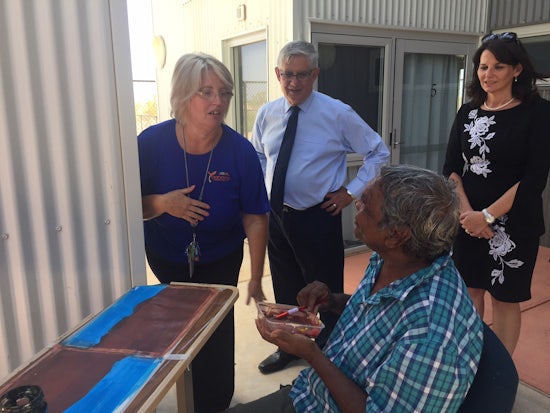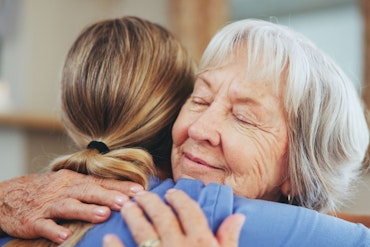New course to create better care for Indigenous Australians
The cultural and unique care needs of Indigenous Australians in aged care are at the heart of a new training course which is set to be launched and made available to all from 22 November.

Minister Wyatt visiting Yaandina in Roebourne (Source: Department of Health)
Developed by the Aged Care Channel (ACC) in partnership with the Department of Health, the Caring for Indigenous Australians: Aboriginal and Torres Strait Islander People course aims to help inform aged care facilities across Australia of the cultural considerations of caring for Indigenous Australians.
ACC Group Manager Content and Production, Steve Iliffe says the program took six months to put together with the help of research, lots of resources, government input and guidance of Indigenous people as well as visits to different aged care facilities in Pilbara and northern Adelaide.
“We thought it was an important program to do because Indigenous Australians do have a series of complex needs different to the rest of the population due to their history and access to health in areas,” he explains.
“They have a connection to the land, a connection to their family and want to still have access to bush tucker and do things that they traditionally do.
“We went out to a number of different aged care facilities to talk to the people there about what they do to provide tailored care.”
ACC Learning and Development Manager Nicola Burton says providing culturally-appropriate care is a crucial part of the person-centred approach.
“The goal of this program is to recognise how to respond to the cultural needs of Indigenous Australians receiving care,” she says.
“There are significant regional differences between Aboriginal and Torres Strait Islander groups, each with complex and diverse ways of life.
“Language, music and art vary in each area, but a connection with culture, community and the land seems to be common to all Aboriginal and Torres Strait Islander people.”
While working of the course and program, the ACC team spoke to and sought the advice of subject matter expert Ngarrindjeri elder and Chair of the Aboriginal and Torres Strait Islander Ageing Advisory Group Mark Elliott.
“It was important for us to work with an indigenous leader – he guided us through the process and the research,” Mr Iliffe says.
“With this new course, we hope that we can increase understanding between cultures because at the end of the day, it’s about creating a home for people in aged care and providing them with a life they are still living.”
Minister for Aged Care and Indigenous Health Ken Wyatt has welcomed the new course, which coincides with his announcement of a new North West Ageing and Aged Care Strategy which aims to create age-friendly communities across the Pilbara and the Kimberley, while encouraging more seniors support services and greater local employment in aged care.
The new Strategy announced by the Minister includes short, medium and long-term goals, from the engagement and inclusion of seniors in local communities, through to tailored home and residential care support.
“[Caring for Indigenous Australians: Aboriginal and Torres Strait Islander People] is an important program which will help address the fundamental need for culturally appropriate care for Aboriginal people, some who may need to use aged care services at an earlier stage of their lives,” Minister Wyatt says.
“Programs like this are a vital part of ensuring the care of senior Indigenous people is as culturally continuous as possible.
“It will contribute to this goal by helping staff understand the impact of historical events and past government policies, along with broadening their appreciation of Indigenous culture and the health challenges faced by some people.
“Giving staff these insights can contribute to better care, and I encourage everyone involved in indigenous aged care to take the course.”
He adds that the aim of the North West Ageing and Aged Care Strategy is to foster quality and culturally relevant residential aged care facilities that allow people to stay connected to community and age safely with dignity.
“Hopefully the new course will contribute to achieving this outcome,” he says.
“The program showcases the Pilbara’s Yaandina residential aged care facility, whose staff are experienced in providing residents with culturally sensitive care.”
Mr Iliffe says the result of the research and creation of the program is close to the hearts of all involved.
“The people involved had the most amazing time and it is something they will cherish forever,” he says.
“These experiences help us more closer to closing the gap.”
The launch of Caring for Indigenous Australians: Aboriginal and Torres Strait Islander People will be streamed live via the Aged Care Channel at 10.45am AEDT on 22 November with Aboriginal Elder Mr Elliot taking part in answering live questions from members.























